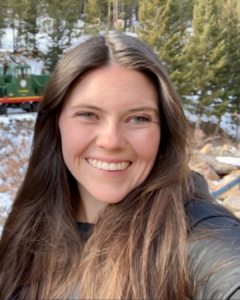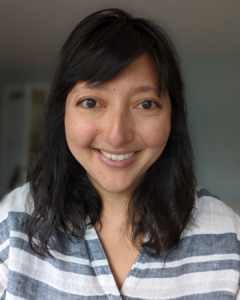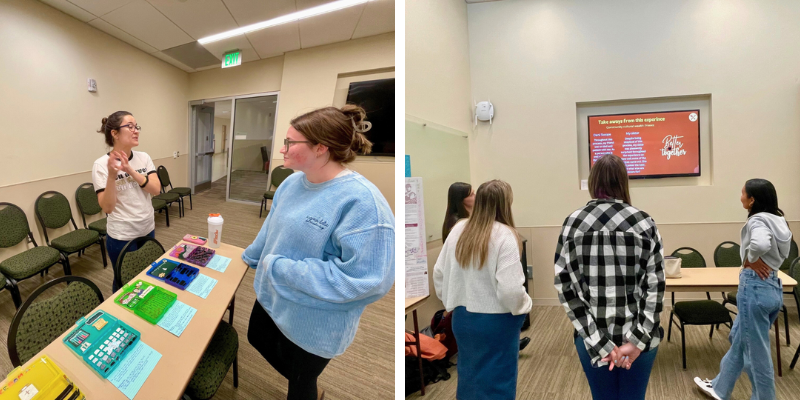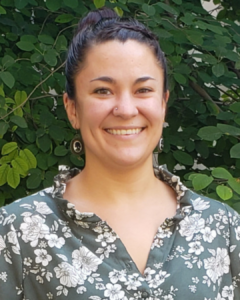In what ways are learning how to read and write the word and the world political?
Inspired by the work of literacy scholars Paulo Freire and Donaldo Macedo, this was the driving question behind E502 The Politics of Literacy, a graduate course taught by Assistant Professor of English Education Naitnaphit Limlamai in connection to the university’s Thematic Year of Democracy and Civic Engagement last fall. Open to graduate and undergraduate students, as well as local educators, the course provided students the opportunity to evaluate and cultivate their literacy skills and study “what forces and factors limit and expand our literacies and our access to it.”
Throughout the semester, students not only developed complex understandings of literacy and literate practices through an examination of history, definitions, approaches, and contexts, but also explored how to apply their learning to their own teaching practices as current and pre-service teachers. For Lauren Grande, a graduate of the M.A. in English Education program at CSU and English teacher at Fossil Ridge High School, the course felt groundbreaking.
“This was such an important course to my development as a teacher. The material was so rich, and I hope it will continue to be offered frequently,” she said.
“Through this class alone I was able to develop three different units across my classrooms, and really think about how to learn alongside my students and consider how they can bring what they learn in my classroom to different spaces and translate it to experiences in their own lives.”

For example, Grande reinvented a unit for her tenth-grade world literature students on global goals for sustainable development in connection to the 17 Sustainable Development Goals (SDGs) devised by the United Nations.
Over three weeks, students could choose a goal to focus on (such as gender equality, clean energy, or zero hunger) and then notice how that goal was materializing in a YA novel. Throughout the unit, students analyzed how the goal was showing up—through plot, character, setting, etc. Next, they brought analysis of their chosen goal beyond the classroom by teaching someone in their own community about it.
“Sharing how they gained literacy in sustainability with someone on the home front turns their learning into actionable change,” said Grande. “The students really connected to that.”

A renewed perspective
Naitnaphit Limlamai, who joined CSU’s Department of English in the fall of 2022, studies secondary English teacher preparation and how that work manifests justice. Specifically, she investigates how justice is defined, constructed, and enacted in secondary English methods classes and how those ideas travel from university preparation coursework to student teaching classrooms.
Initially, Limlamai was anxious to teach E502 as she does not identify as a “literacy scholar,” in the way her friends and colleagues do. After workshopping the syllabus and doing her own research, she became eager to teach the course through a fresh lens.
“In reviewing the historic syllabi and envisioning and creating something new, I became very excited to teach the course. Literacy is and has always been political,” she said.
“I’m talking about reading and writing, yes, and you don’t have to look very far in the history of our country to see that we have historically and in contemporary times restricted who can read and write and what they can read and write. This alone makes the class feel important to teach now.”

Limlamai also noted that the course felt particularly significant due to students bringing their own literacies, knowledges and experiences into the classroom.
“In our class, we shared ways in which we are literate outside of literacies valued in school. This ranged from being literate in textile arts like quilting, knitting, and crocheting; to playing video games; to being able to identify and call out white supremacy; to being subversive; to knowing when they could be themselves and when they have to mask,” she said.
“In other words, the course was important because students felt like they could bring their whole selves into the space.”
Kit Robinson, a second-year student in the English Education graduate program, is excited to take what she learned in E502 and apply it to her future secondary English language arts classrooms.
“This course encouraged me as scholar and also as a public-school educator that I can break open the system and have my students practice their writing skills without boxing them inside a set of rules on a rubric,” she said.
Robinson, who earned her B.A. in English Education in 2019 at CSU, recently taught high school English in the Denver metro area before returning to pursue her master’s degree. During her three years in public schools, Robinson taught several students who identified as first-generation American and whose first language was not English. While navigating the state-approved curriculum, Robinson was met with a sense of inflexibility in terms of accommodating her students’ linguistic skills and home languages.

“This course encouraged me as scholar and also as a public-school educator that I can break open the system and have my students practice their writing skills without boxing them inside a set of rules on a rubric.”
“In some ways, students are taught to believe that as they come into society, they must lose a part of themselves. That to be successful, they need to conform to certain language standards that ask them to sacrifice their identities,” she said.
“In E502, Dr. Limlamai talked about pushing against this idea, and asked us how we can form cracks to upend this kind of rigid view, which I think is really powerful.”
Pursue your M.A. in English Education
The Master of Arts (M.A.) in English Education at Colorado State University is designed for educators who want to be innovators. Whether you are already a practicing teacher or are preparing to enter the profession, we invite you to join a program that will deepen your teaching practice, challenge your thinking, and help you create classrooms that will change the world. Learn more at https://english.colostate.edu/graduate/ma-in-english-education/